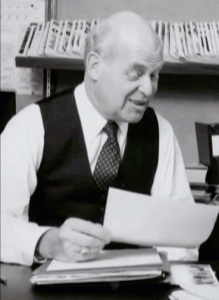By Francie Mangan
Similar to the way his 1970s Texas Instrument home computer was plugged into the electrical circuit, Lewis H. Young was mechanically and passionately plugged into the world of business journalism and corporate America.
Young’s love for business in addition to his trend spotting abilities contributed to his significant impact on the world of business journalism during his 15-year tenure as editor-in-chief of Business Week magazine.
During his editorship, BusinessWeek became the first non-computer magazine to cover the emerging electronic industry. And Young made Business Week the most trusted business magazine in the nation. The magazine won four National Magazine Awards, including two for general excellence.
Young was born in Philadelphia in 1924. Prior to becoming the editor-in-chief of Business Week, he earned degrees in mechanical engineering and physics from Purdue University. Following college, he worked as a physicist for the Bettis Atomic Power division of the Westinghouse Electric Corp. He also earned his master’s degree in business administration from New York University and served as a first lieutenant in the Army Corps of Engineers.
However, Young found his true calling when he joined McGraw-Hill Publishing in 1951 as a reporter. After working a few jobs at McGraw-Hill as editor of Electronic Magazine, Young in 1969 became the editor-in-chief of Business Week.
“He took what used to be a trade magazine and turned it into the most successful business magazines that is still quoted even today,” said Shelia Cunningham, former corporate finance editor for Business Week.
As editor-in-chief, Young directed the magazine with a strong hand, always emphasizing original stories and aggressive in-depth reporting.
“He wanted stories that did not depend on the latest news in the last five or six days,” said Stephen Shepard, Young’s successor and editor-in-chief of BusinessWeek from 1984 to 2005. “He wanted the stories that made news themselves.”
Young would go to great lengths to ensure each issue of the magazine had original stories even if that meant getting into an argument with a colleague or killing a story.
In addition, Young also stressed the importance of clear and concise writing, rather than stylistic writing. Young believed that fancy writing masked holes in the reporting. In Shepard’s book, “Deadlines and Disruptions,” Young was quoted saying “one of the reasons you trust bankers is because they are sober and boring. If bankers wore Hawaiian shirts and long hair, you wouldn’t trust them.” His regard for good plain writing enabled the magazine to appeal to a broader audience of Americans interested in business.
Young also implemented “the forward spin,” which was the idea that each article needed to explain its importance and relevance to the future.
“I think one of his biggest strengths was that he was masterful at discerning trends in the business world,” said Judith Dobrzynski, former corporate strategies editor and correspondent for BusinessWeek. “We used to say that Lew could see around a corner, he was so good at seeing trends.”
Young anticipated two of the most influential trends of our time: the globalization of business and the technology revolution. His ability to understand the globalization of business and spotting the growth of the “tiger economies of Southeast Asia” led Young to expand Business Week’s international coverage to numerous countries around the world. He defined the globalization of business as not only selling products and services over seas, but also building factories and companies outside the United States.
Due to his prophetic outlook of the future, he also foresaw the technological revolution. He was the first to create a department called “Information Processing” that was devoted to covering the emerging field of technology in the Silicon Valley and around the country. In addition to his knack for electronics, Young was also enthralled by corporate strategies of small and large businesses.
Regardless of what area of business Young covered, he was always was prepared to take down any wrongdoers of business.
“One of the joys was watching Lew interact with corporate executives,” said Dobrzynski. “He was the best at scrutinizing them and asking them very tough questions. He did not refrain from asking any tough questions to them just because they were CEOs. Instead, he treated them as equals.”
In addition to his “moral streak ” in regard to the transgressions of business, Young also stood behind all of his reporters. Although he did not compliment his coworkers on a regular basis, Young valued hard work immensely.
His daughter Anne Young Albanese said the one thing that she learned from her father was to “always work hard and try your best.” Young not only relayed this message to his family and his colleagues, but he embodied it.
After retiring from Business Week in 1984, Young moved to Hong Kong to continue to his passion for business journalism. At the age of 73, Young was still working as the editorial director of Electronics News, a Cahners publication. His unending energy and zeal for business journalism ended on June 12, 1998, when he died from a heart attack.
Although Young was unable to witness the technological and global advancements in business today, he continues to serve as the foundation for the evolving world of business journalism.
Francie Mangan is a business journalism major in the Class of 2015 at the University of North Carolina at Chapel Hill’s School of Journalism and Mass Communication.
